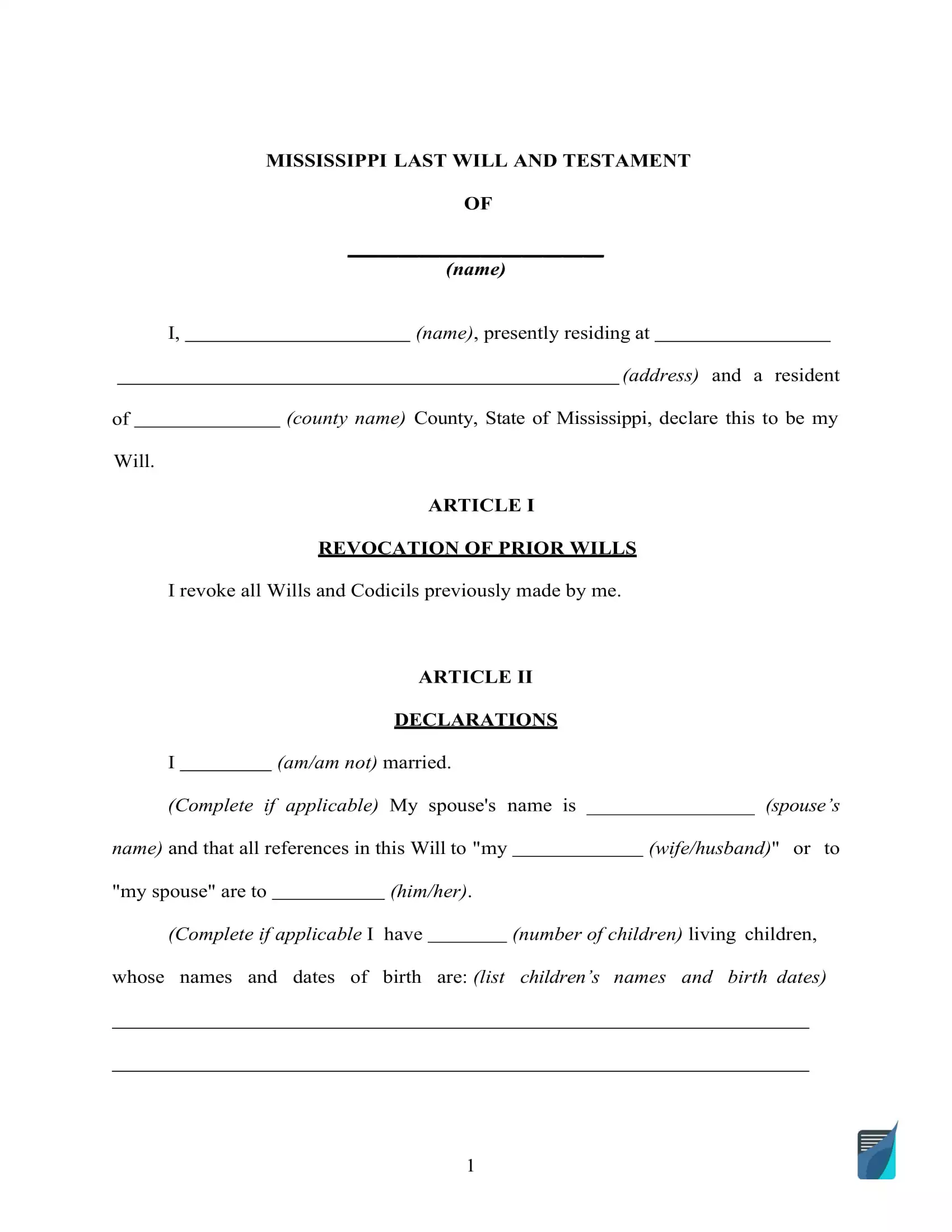Mississippi Last Will and Testament Form
A Mississippi last will and testament is a legal instrument that contains the directions of a person (the testator) pertaining to their property and assets distribution rules in the event of their death, written in the form prescribed by their home state law. Mississippi wills are valid if witnessed by two competent and disinterested adults or written entirely by the testator’s handwriting and signed by the testator.
In case you are trying to find a printable and fillable last will and testament template valid in MS, you’ll find it on this page in PDF and Word formats, in addition to will creation guidelines, requirements, and laws.
Mississippi Will Laws and Requirements
| Requirements | State laws | |
| Statutes | Title 91 – Trusts and Estates; Chapter 5 – Wills and Testaments | |
| Signing requirement | Two witnesses | § 91-5-1. Who may execute; signature; attestation |
| Age of testator | 18 or older | |
| Age of witnesses | 18 or older | |
| Self-proving wills | Allowed | § 91-7-7. Proof of due execution of will |
| Handwritten wills | Recognized if meeting certain conditions | § 91-5-1. Who may execute; signature; attestation |
| Oral wills | Recognized if meeting certain conditions | § 91-5-15. Nuncupative wills, § 91-5-19. |
| Holographic wills | Recognized if meeting certain conditions | § 91-5-1. Who may execute; signature; attestation |
How to Write a Will in Mississippi
1. Consider your possible format choices. Decide whether you prefer hiring legal professionals or creating your last will by yourself (either by working with a last will and testament template or by going through our custom document maker that provides a bit more options and removes some of the hassle present in the first option).
2. Specify your information (if it’s you who is creating the will). Establish the testator and their details: full legal name and address (city, county, and state). Review the details you entered to avoid any mistakes.
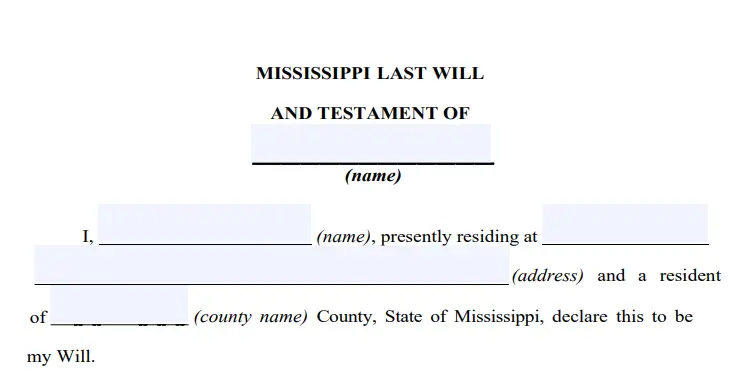
3. Choose the executor (personal representative) of your estate. In this particular passage, you decide who’s going to execute what’s written in your last will and testament by filling in their full legal name, along with their city, county, and state of residence. This person must be a competent adult without any past felonies committed (§ 91-7-35).
Mississippi doesn’t have any special rules regarding out-of-state executors and representatives, but it’s still advised to designate somebody who lives in the same state as you. It also makes sense to choose one more person to perform the duty of your executor in case the first one is unwilling or not capable of carrying out your will.
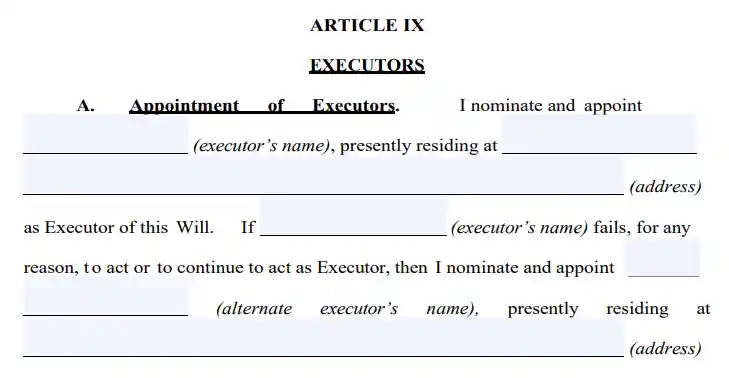
4. Choose a guardian for minors (optional). It’s possible to appoint a trusted person as a guardian if you have underage or dependent children that need to be taken care of. If there are no directions regarding exactly who should look after your kids, the guardian will be selected by the court. More about guardians for minors in this state: Duties – § 93-20-208, Powers – § 93-20-209.
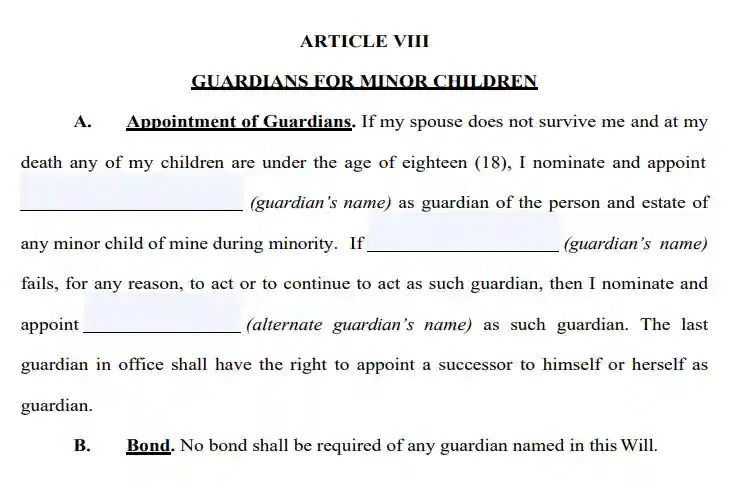
5. Specify your beneficiaries (heirs). Now specify individuals (or charitable organizations) to whom you hand on your estate, that is, your beneficiaries. For every individual beneficiary, fill out the following details: full name, address, and the way they are related to you.
6. Determine your assets’ distribution. You can decide what property goes where. It includes cash, shares, real estate, business ownership, money for arrearage, as well as any physical things of monetary value you possess can be mentioned in the last will. Please be aware that there are things that can’t be distributed in the last will and testament, for example, jointly obtained property and life insurance money.
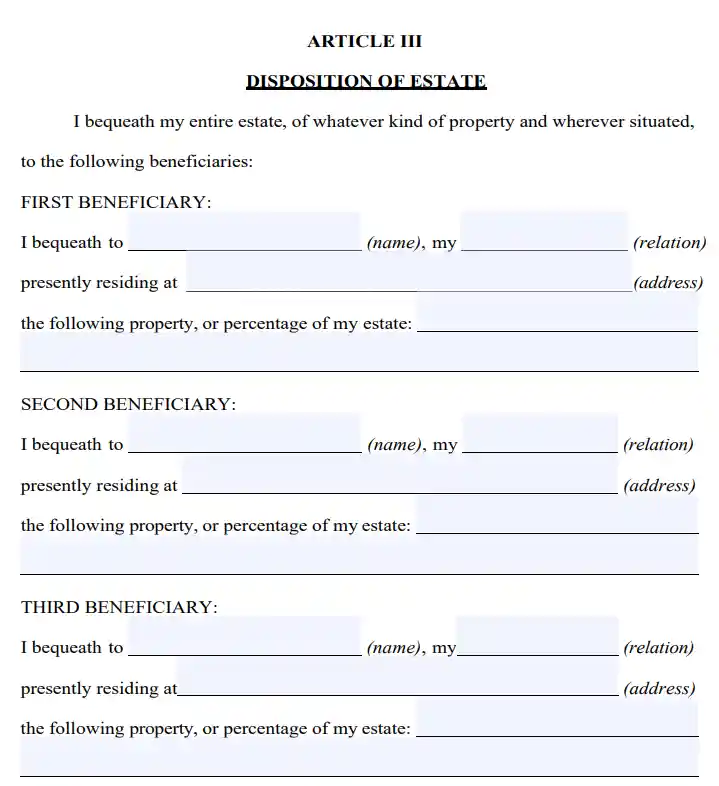
7. Proceed with the witnesses putting the signatures at the end of the document. As per the Mississippi Statutes (§ 91-5-1), for any last will and testament to be considered valid, it has to be signed by two competent witnesses. They have to be over 18 years of age and preferably have no interest in your last will’s legacy.
After a complete revision of every section in your MS will, all parties involved (you and the two witnesses) must write their names and full addresses and sign the form.
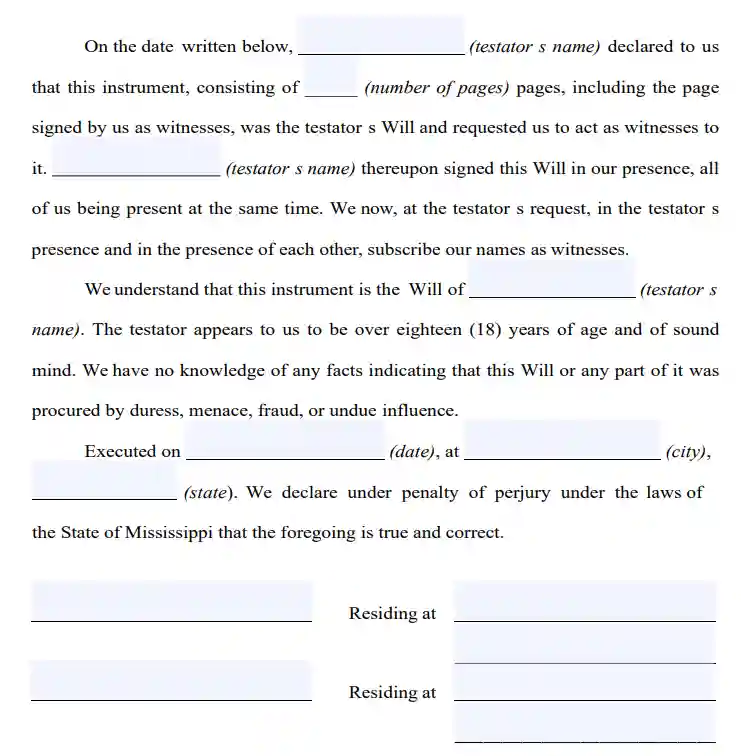
Make a Free Mississippi Last Will and Testament
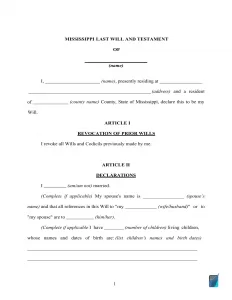

Frequently Asked Questions
Must I notarize my will in Mississippi for it to be valid?
No, in Mississippi, there’s no need to notarize your will. However, if you wish to add a self-proving affidavit to your will, you will have to notarize it. If you make your will self-proving, the court won’t need to speak to the witnesses to determine the validity of the document, which will facilitate the probate process and make it easier for the parties involved.
Should I ever opt for a holographic last will?
A holographic last will is an entirely handwritten document. For it to be effective, the document has to be wholly in the handwriting of the testator and dated and signed by him or her (§ 91-5-1). But, such last wills are usually considered a temporary alternative. You would like to upgrade this type of a last will with a typewritten one when you can by using a lawyer’s support or a fillable template. It isn’t advised to hold a holographic last will as your final version because it could contain ambiguous or conflicting statements, causing much stalling during the probate.
Is it possible to disinherit your child or spouse?
No, in Mississippi, you cannot disinherit your spouse. A surviving spouse can renounce a will if the document doesn’t provide for them (§ 91-5-25). However, marriage abandonment can be a reason a surviving spouse can lose the right to their legal share – Estes v. Estes, 226 So. 3d 634 (2016).
As for children and other family members, it is legal in Mississippi to disinherit them in your last will and testament. By adding particular disinheritance paragraphs to your will, you’ll be able to leave out your adult children or any other relatives from receiving any of the properties and assets you possess.
Am I allowed to alter a typewritten will after signing it?
Yes, you are. Based on Mississippi law, it’s possible to change or revoke the will at any time before you die. It will also be a wise decision to review your last will on such occasions:
- A child has been born or adopted
- Divorce or marriage
- Real estate or considerable piece of property has been sold or bought
Use a codicil for some small changes, but for major ones, consider creating a new will.
What should I do if my last will and testament has been lost?
A duplicate of a lost will may be allowed to probate in Mississippi if it can be proven that the original will was duly signed, witnessed, and then lost. Case example – Matter of Estate of Mitchell.
What should I do if I am physically unable to sign my will?
Solely per your directive and in your presence is someone allowed to sign your last will and testament (See Miss. Code § 25-34-19). The process must be certified by a notary public with a special “signature affixed” clause.
| Related documents | Cases when you could need to make one |
| Codicil | You would like to slightly change your will without writing a new document from scratch. |
| Self-proving affidavit | You would like the probate to be faster when the time comes. |
| Living will | You want to state precisely what health care you expect if you can’t communicate that yourself. |
| Living trust | You would like to deal with your end-of-life affairs without probate. |

